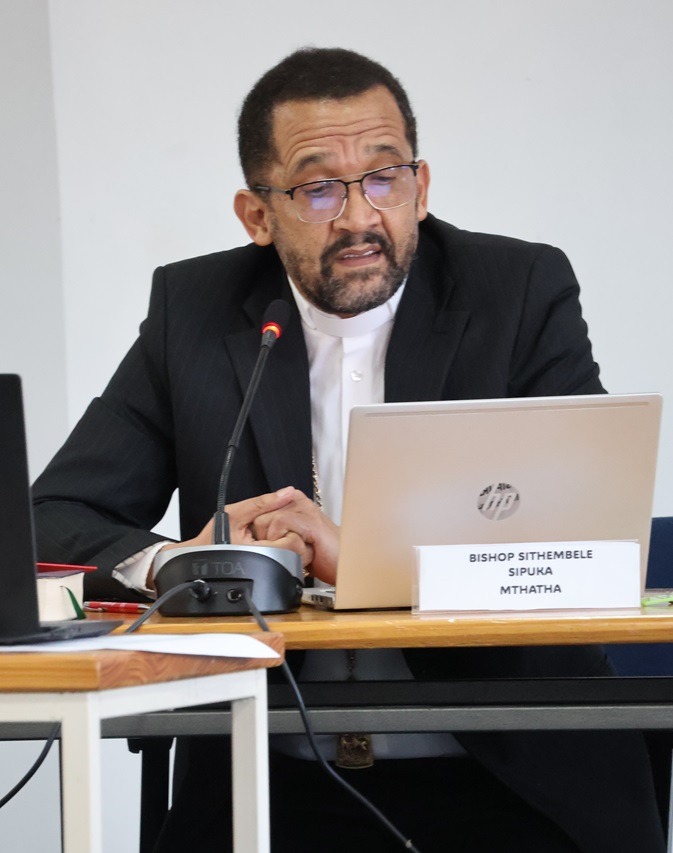In his welcome address to members of the Southern African Catholic Bishops Conference (SACBC) gathered in Mariannhill Diocese for the August 5 to 9 Plenary Session, Bishop Sithembele Anton Sipuka welcomed the newly appointed Apostolic Nuncio to Southern Africa.
“We are glad you finally arrived,” said Bishop Sipuka as he welcomed Archbishop Henryk Mieczysław Jagodziński. He assured the Papal representative that the SACBC is a “good Conference” where members treat one another in a spirit of “brotherhood” and “always look forward to (their) plenary meetings, where (they) enjoy each other’s company, discuss issues openly, and make decisions with one voice.”
The SACBC president also thanked the Chargé d’Affaires a.i. of the Apostolic Nunciature in South Africa Monsignore (Mgrs) Dario Paviša for his continued service following the transfer of the former Apostolic Nuncio Archbishop Peter Wells to Asia in 2023.
He said, “Being glad about your arrival does not mean we have complaints about Mgrs Pavisa. On the contrary, Mgrs. Paviša has served us well and has been a good company. We are impressed with his efficiency and helpfulness and thank him sincerely.”
As his second term as president of the SACBC comes to an end Bishop Sipuka in the 10-page opening remarks addressed some of the SACBC achievements and challenges faced by the conference’s three member states namely Botswana, Eswatini, and South Africa.
The implementation of the SACBC 2020 Pastoral Letter, social, and political issues, shortage of vocations to the priesthood and religious life, Catholic minority in the region, fundraising initiatives amid economic constraints and high levels of unemployment, demarcation of Dioceses, and the limited evangelical influence through Catholic education due to running most Catholic schools in “collaboration with the government,” as well as the possibility of establishing a Catholic institution of higher education led by the Future Vision task team were some of the issues addressed by Bishop Sipuka in the Tuesday, August 6 address.
The Local Ordinary of Mthatha Diocese went on to address the recent general elections in South Africa and the upcoming elections in Botswana. He lauded South Africa’s peaceful elections and the creation of a Government of National Unity, the reduction of loading shedding.
Bishop Sipuka commended South Africa for remaining “politically stable,” and expressed concern regarding the “recent news about the presence and financial operations of individuals linked to ISIS in South Africa,” as well as ongoing corruption, “rising number of armed robberies, kidnappings, armed stock theft syndicates that appear to operate with freedom and taxi groups that have organised themselves into untouchable armies,” and addiction to alcohol and substance abuse among young people in the region.
“Concerns have also been raised about corruption and money laundering involving some high-ranking leaders in Eswatini,” he added.
Addressing the ongoing conflicts in the Middle East and other war-torn countries, the 64-year-old Prelate thanked Pope Francis for his “pastoral solicitude” and initiatives by the South African Council of Churches to facilitate a joint engagement in the “conflict by world Abrahamic faith leaders.”
In the August 6 welcome address Bishop Sipuka said the conference bemoans “the blasphemous depiction of Jesus and the disciples at the Last Supper as drag queens” during the opening ceremony of the Olympic games in France this year.
He said, “The explanation, therefore, that this piece of theatre was meant to include everybody does not hold because the Eucharist, of which the last Supper is its foundation, is something that we take very seriously as Catholics and cannot allow people to make a mockery of it.”
“We, therefore, add our own voice to many other voices in expressing our displeasure and hurt about the ridiculing and insulting of an event so central to our faith. We call upon all Catholics not to be discouraged but to continue to hold firm in their faith about the Eucharist, even in this act of being ridiculed,” he added.
In his concluding remarks, Bishop Sipuka addressed the Synod on Synodality, the call for the ordination of women to the diaconate, and the call for the ordination of matured and proven married men as per the “Amazonian Synod of October 2019,” which concluded with a vote of 128 in favour and 41 against.”
Bishop Sipuka called for an ongoing discussion due to the SACBC shortage of priests which has led many Catholics, especially in rural areas to be deprived “of the major source of Catholic identity, the Eucharist.” He referred to Bishop Emeritus of Aliwal Diocese Fritz Lobinger 2007 book titled TEAMS OF ELDERS: Moving Beyond Viri Probati (Latin for “respected men,” or men of proven faith).
He said, “Bishop Lobinger, quoted by the Pope some time ago on this subject, has written a book of over 200 pages, theologically motivating for the ordination of Viri Probati. But as bishop Lobinger would argue, this should not be done solely because of the shortage of priests.”
“While the Viri Probati concept is not original to us, the version Bishop Lobinger proposes is uniquely local and homegrown. It would be good to share with him as he embraces the sunset of his life that we are building on his thoughts for a possible solution to the felt pastoral need of providing variation of priesthood for a vibrant church,” concluded Bishop Sipuka as he declared the plenary session officially opened.


0 Comments